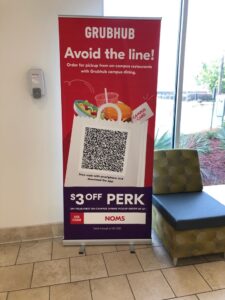
Photo by Mariah Wiggs
FAMU has taken a new approach to campus amenities based on Centers for Disease Control and Prevention suggestions.
The CDC is a federal agency that serves as a national public health institute. On the agency’s website, cdc.gov, it suggests the lowest risk of spreading COVID-19 involves restaurants limiting public food service to drive-through, delivery, take-out and curb-side pickup. In addition, individuals should maintain at least six feet of separation as much as possible in public areas that may lead to close contact among other people, like weight rooms and group fitness studios.
FAMU’s new partnership with GrubHub and decade-long partner Intramural Leagues, allows students to access services around campus while keeping these guidelines in mind.
Prior to COVID-19, the university and Metz were considering services for food delivery. Tripp Goodwin, general manager for Metz Culinary Management, FAMU’s dining provider, explained their strategizing process leading into the school year.
“As the situations surrounding the coronavirus developed, social distancing guidelines, along with decreases in seating capacity required our team to look for innovative ideas as to how we could maintain our ability to serve our customers safely and conveniently,” Goodwin said.
With a win-win combination of a fiscal return for the university with every purchase through the GrubHub app, and a solid solution to maintaining social distancing with students on campus, Goodwin believes the app has become a key to meeting COVID-19 guidelines.
“The GrubHub Mobile Food App provides a viable solution,” Goodwin said.
This week, 10-year campus partner Intramural Leagues (IMLeagues) program helped launch the FAMU Come and Play App. Come and Play is a campus recreation branded app fit for all students.
“The app now allows us to connect our student users to all of our fitness actives and sign up for intramural leagues and tournaments on their phone,” said George Heimbach, assistant director for campus recreation.
The app allows students to schedule a one-hour time slot to work out. Heimbach said that users also need a greater social distance when it comes to working out.
“We asked ourselves, if we have a bunch of users coming back, what is going to give them a fair opportunity for them all to use it?” said Heimbach.
With that in mind, the recreational center has instituted a 10-feet social distance rule for students using the facility and a 30-minute sanitation after each session.
With no definite answer as to whether the university will utilize these apps after COVID-19, some students remain optimistic about their current condition.
Business administration major Ladarius Lee is on board with the apps being used for student services.
“I feel like it falls right in line with the CDC guidelines as well as being very useful and resourceful for students,” Lee said. “Honestly, we could use this same method after COVID-19 goes away because it is such a convenience. I think they did a very good job with that.”
Both apps for dining services and campus recreation can be found on IOS and Android devices through the app store.